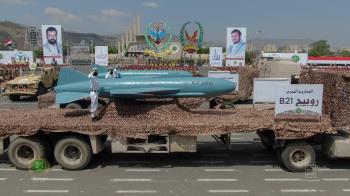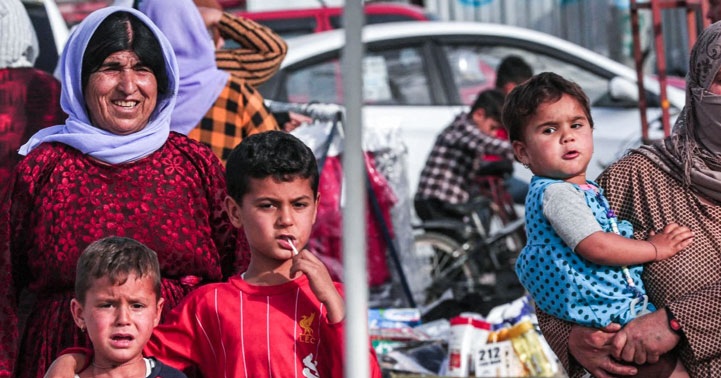Alwaght- Years after the tragedy of horrific crimes committed by the ISIS terrorist group against the Yazidi minority in Iraq’s Sinjar, the region has not returned to its pre-crisis status. Sinjar is still not secure for the displaced and thousands in this region are in a state of uncertainty and confusion. This situation drives Iraqi officials to, from to time, call for immediate handling of the situation of the refugees and warn about the consequences of the improper living conditions. In this regard, Popular Mobilization Forces (PMF) chief Faleh al-Fayyad on Saturday in a speech said that return of refugees to their homes in Sinjar requires talks with the Kurdistan Regional Government (KRG). According to the Iraqi official, Sinjar’s stability is important and its situation is politically unpleasant for the Iraqis.
In August 2014, ISIS terrorists raided Sinjar in West of Nineveh province and killed and injured a number of Yazidis. They also displaced them from their homes, and since then, no positive measures have been taken for their return. This is in addition to kidnapping of thousands of others, mainly children and women, whose fate is unclear yet.
Baghdad-Erbil differences, the main obstacle to refugee return
The poor security situation in Sinjar comes as KRG officials, the international community, and the Iraqi government are responsible for stay in the refugee camp of about 300,000 Yazidis, most of whom in the Kurdistan region. However, only 20,000 families have so far returned home to the Sinjar region after their freedom from ISIS hands. It is noteworthy that Baghdad and Erbil reached an agreement in October 2020 to normalize the situation in Sinjar, under which they agreed on joint administration in judiciary, security, and services. Based on the agreement, peace and stability were supposed to be recovered to Sinjar and the conditions for the return of refugees were to be prepared. But the agreement has not yet been implemented for political reasons.
In August 2020, a Yazidi lawmaker in the Iraqi parliament reacted to the inaction of the central government and KRG to restore normal security conditions to Sinjar region, saying that after several years from liberation of the region, administrative, security, and service sectors are unstable yet. This situation has led to further instability and difficulties for the refugees to return home, according to the member of parliament. This Yazidi MP asked the central government and the Kurdistan region’s administration to find a solution to organize the administrative and judicial affairs of Sinjar so that thousands of refugees can return to their homes.
Political differences between Baghdad and Erbil in recent years have affected security situation in some cities, including Sinjar. Erbil leaders always prevent the entry of PMF to establish security in the northern regions despite the fact that these forces have shown in recent years that they have established security and stability wherever they have operated, and they can do the same successfully in Sinjar so that refugees can return to their homes after years of displacement. Although the central government and the PMF factions are determined to fix the situation in Sinjar, now everything depends on Erbil to show a will to solve the problems of this region.
PKK replaced ISIS
Though ISIS threats no longer exist in Sinjar, there are other challenges that block the return of Sinjar refugees. In addition to KRG obstructions, presence of other separatist and terrorist groups in Sinjar is adding fuel to fire. Owayed al-Jaheishi, a former member of Nineveh provincial council, recently emphasized the need to restore rule of law and security to Sinjar for the good of stability. He added that the central government should handle PKK presence in the region. According to the official, the PKK has formed a loyal militia dubbed Sinjar Protection Units in the city.
Sinjar Mayor Mahma Khalil notes that PKK is hindering implementation of Sinjar agreement and refugees return. The group’s presence in the region is illegal because it is a non-Iraqi group, said the mayor. Khalil explained that the federal government is serious about the implementation of the internationally supported Sinjar agreement, noting that the key to normalcy lies in providing security and services for the return of the refugees. The PKK refuses to leave Sinjar and Turkey carries out attacks against its fighters from time to time, increasing the fear of the refugees to return home.
Given the security situation in Sinjar, some Iraqi sources suggest that if the central government enters the city, clashes will erupt with PKK and its affiliates and this risks worse conditions. According to these sources, PKK elements have been preparing for a conflict with the Iraqi army and PMF for months. The PKK has been trying to dig a tunnel in Sinjar mountains for several months, as if it is preparing to impose its presence on Iraqi government, sources further said.
PKK dreams of separation and formation of a government and is comparable to ISIS in pursuit of its agenda. Its presence is one of the barriers ahead of return of Yazidi refugees. Baghdad government has repeatedly asked Erbil to restrict activities of terrorist organizations in Kurdistan region, bit the Kurdish leaders are turning a deaf ear and in other words give the group a leeway for activity, to an extent that it even takes actions against Iran’s national security, arousing the ire of Iranian officials.
Sinjar mountains are significant because whoever tightens its grip on this region, it can control southern and southeastern parts like Tal Afar and Mosul. Also control of Sinjar means security dominance over a large part of the Iraqi-Syrian borders from Rabia to borders of northern Al Anbar. That is why after ISIS obliteration, other terrorist groups like PKK set their eyes on it. Given the fact that KRG leaders are closing their eyes to PKK crimes, the group is running rampant around Sinjar and its vicinity.
An excuse to Turkish occupation
Having in mind that the Turkish government sees PKK as the biggest threat to its national security, it occupied parts of northern Iraq and built military presence there under the cover of fighting the militant group. Therefore, as long as PKK acts freely in the Kurdistan region, Turkey has an excuse to continue its occupation of part of Iraqi soil. This issue over the past two years has posed the biggest security challenge to the central government that criticizes the Turkish attacks as a violation of its territorial integrity. Turkish attacks have been expanded so wide that PMF factions have warned Ankara to pull out its forces immediately, or they will use force to expel them. Several drone attacks have been launched at Turkish bases so far.
Another important challenge in Sinjar, as former Kurdish officials have said, is the simultaneous presence of two local governments in the city, one appointed by federal government and the other an elected government that administers from Dohuk province. Two parallel governments not only bring no stability, but also lead to the escalation of security tensions. Internal tensions in Sinjar, in addition to blocking the return of tens of thousands of refugees, will also lead to the displacement of thousands of others and can create political predicaments. Therefore, amid growing problems in Sinjar, the best solution is to resolve the differences between the central government and Kurdistan region and boost security cooperation for return of refugees.
Since the Yazidis of Sinjar are ethnically close to the Kurds, Erbil leaders need to abandon their ambitions and cooperate with Baghdad over the refugee return. Given the experience of the PMF in fighting the terrorists, if Erbil shows green light to the entry of popular forces to Sinjar, PKK will be obliterated in the city in a short time. With security restored, the way for return of refugees will be paved. At the same time, Turkey will lose the excuse for its military intervention and Iraq will be more stable than before.



























